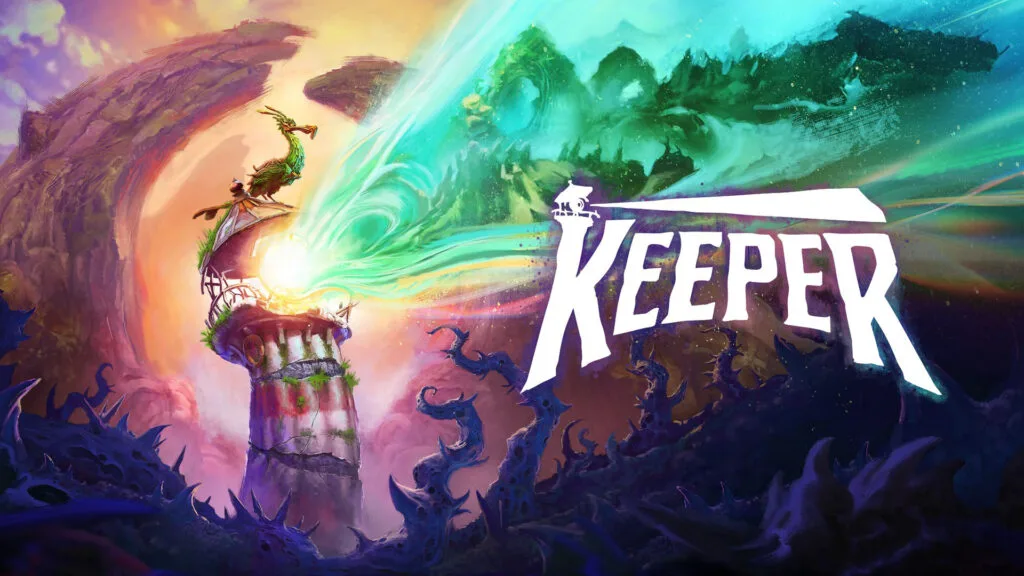In a year packed with massive RPGs, gritty shooters, and flashy sequels, Keeper feels like a breath of fresh sea air.
Developed by Double Fine Productions known for their wonderful and wacky art style from games like Psychonauts, this adventure puts you in control of a walking lighthouse. Yes, a lighthouse. With legs. I was very curious yet surprised on the overall concept of this game and how it was going to play out and why this might be one of my favourite games of 2025.
The opening scene of Keeper is strange and beautiful and very on brand for the Double Fine team. You awaken as a dormant lighthouse on an island long forgotten by time and life. The ocean hums, the sky flickers with doom and gloom, and with a groan of rusted metal, the lighthouse sprouts legs and takes its first steps which leaves you wondering what adventure lies ahead. It sounds mental, but it works.
The first time you move that slow, lumbering stride across soft sand there’s something oddly bittersweet about it. It’s clumsy, awkward, and alive. Like a toddler trying to gain it’s first steps you constantly fall left to right until the lighthouse figures out what legs are and how they work. You’re don’t play as a hero on a quest to save the world. You’re an ancient machine rediscovering movement and purpose in life.
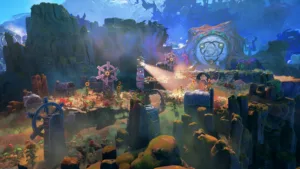
Your only companion that you find amongst your exploration is a small seabird named Twig. It flutters around, perching on your shoulder, guiding you with chirps and flaps. The relationship between you and the bird is the beating heart of the game a wordless friendship built entirely on trust and shared curiosity. Twig floats and flys around interacting with the world around you as you explore and aids you when needed the most. The relationship between you and the bird is the beating heart of the game that is built on trust and hope and unlikeliness.
There is no text boxes, dialogue or voice acting. The story is unfolded by light, sound and the momentum of exploring. In a world drowning in desperation, Keeper chooses silence and it’s gripping and captivating wanting to just plough through and put the world to rights.
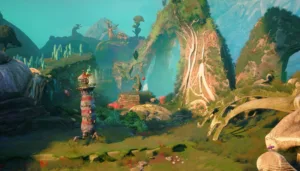
Before I start, Keeper isn’t a game for players chasing adrenaline. There are no enemies to fight per say, no boss battles, no skill trees to grind through. Instead, it’s a meditative puzzle-exploration experience where you use light to interact with the environment to vanquish darkness or a path that is blocking your progress.
Your lighthouse beam isn’t just for show. You can adjust its focus, revealing hidden structures, activating flora, or waking strange sea creatures from slumber to help you out in certain sections at a pinch. At times you’ll need to coordinate with Twig sending the bird to flip switches or distract curious wildlife while you shine your beam to reshape the landscape which shapes this unlikely duo and strengthens the bond.
The puzzles are rarely complex and nailed on that it’s more about discovery than difficulty but that’s part of the charm. Keeper invites you to notice artistic details in the biomes like how the sand shifts under your legs, how plants pulse when touched by light, how the world reacts to you entire presence.
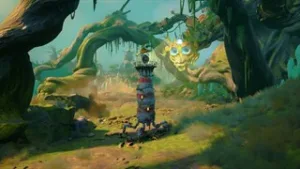
The island itself is the real star. It’s one of the most striking game worlds of the year lush, haunting, and full to the brim with personality. Each area feels like a living and breathing ecosystem. You find yourself along the way in different areas that unlock new exploration move sets and tools to use on your journey. The Pollen Fields shimmer with fluffy clouds that alters gravity, letting the lighthouse float dreamily between platforms. The Coral Canyons are bioluminescent labyrinths of plant like creatures that sway like kelp in a current. And deep in the island’s core, ancient ruins whisper hints of the world’s forgotten past.
There’s very little explicit storytelling, but the environmental design is that intense it tells you plenty. You’ll find remnants of human civilization with overturned boats, decayed piers and rotting structures all overtaken by nature. The picture is clear from the start, whatever happened here the planet moved on. The best part? The island never feels static with an everchanging environment, plants reacting to your light and strange creatures scattering as you pass.
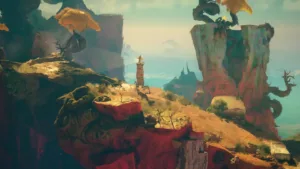
Visually, Keeper is mesmerizing and had me in a chokehold. Textures look hand-brushed, lighting feels organic, and every frame could be paused and printed as concept art and found myself just taking a absurdly amount of screenshots.
The colour palette evolves as you progress, it’s a constant visual conversation between light and dark, presence and absence to show the stark contrast from points of certain doom and gloom to glimpses of hope and the sound design is superb with just how in depth and in detail they have gone to tell this story. The creak of metal, the distant cries of world around you, the low hums and flickers of your light beam. The score, composed by longtime Double Fine collaborator Peter McConnell is a perfect match and the driving factor of showing this story off in the best ‘light’ possible.
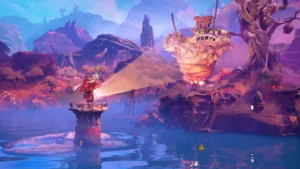
Keeper takes less than ten hours to complete just enough to immerse without overstaying its welcome. The pacing is slow, but intentionally so. It’s the kind of game best played as a long session sat in the dark just soaking everything in around you as the world adapts and evolves so does your understanding of the story unravelling around you.
Still, that pace won’t be for everyone. Some players might find the lack of direction frustrating. There are stretches where it’s not entirely clear what to do next. You’ll shine your beam around, backtrack a little, experiment and then, suddenly, something clicks.
There’s also minimal mechanical variety. The core loop move, explore, shine, solve doesn’t evolve much. The environments change and gameplay mechanics change a little but the way you interact with them stays familiar. For some, that steady rhythm is meditative. For others, it might feel repetitive quickly. But if you approach it with the right mindset and treating it less like a checklist and more like a journey the game rewards you.
In a gaming landscape obsessed with size and spectacle, Keeper stands out precisely because it’s small and sincere. It’s also a reminder that games can be about presence not combat, not collection slogs, but being someone and feeling something.
Overall
-
CX Score - 90%90%
Summary
Pros
- Unique Concept
- Stunning Visuals and Soundscape
- Peaceful, Low-Stress Gameplay
Cons
- Slow pacing for some

